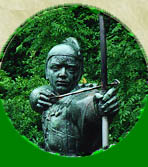|
ROBIN HOOD'S PROGRESS TO NOTTINGHAM
No. 139
From The English and Scottish Popular Ballads
by Francis James
Child, 1888.
Warning!
This ballad is far more violent than the Robin Hood stories you might be
used to.
The
earliest ballads don't explain why Robin and his men became outlaws --
they just are. Over the centuries, various stories have been written about
the motivations behind Robin Hood becoming an outlaw. This is one of them.
It is more exciting but also more bloody than the 16th century theory that
Robin Hood became an outlaw because he went into debt. While this ballad
is first recorded in the 17th century, a summary of these events occurs
in the Sloane manuscript of 1600. It often opens the ballad collections
of the 17th and 18th century, and a somewhat cleaned up version commonly
appears in Robin Hood children's books even today.
In Howard Pyle's 1883 The Merry Adventures of Robin Hood of Great Renown in Nottinghamshire, Robin only killed one of the foresters, and he was felt great remorse at having taken a life. The Robin Hood of the ballads did not have the same morals as his counterpart in 19th century children's novels. Click here to read Howard Pyle's version of this story.
Some
books and movies offer a different origin, but one that also involves foresters.
Much the Miller's Son was caught for killing a deer. He was hungry, yet
the laws of the time said that only the king could hunt deer. Robin stopped
the foresters from capturing Much. (This scene most notably appeared in the 1938 film The Adventures of Robin Hood starring Errol Flynn, and many later TV and film versions have included a variation of it.) The killing of deer and the forest laws
are themes that re-occur in many Robin Hood ballads.
Four
stanzas of this ballad have survived in the memories of singers from Nova
Scotia, Canada. Those stanzas are of Robin killing and maiming with not even the
hint of motivation offered here.
Click here to view images of the original Progress to Nottingham broadside ballad in different variations from the Broadside Ballads Online site from the Bodleian Libraries.
1
Robin Hood hee was and a tall young man,
And Robin Hood he was a proper young man,
Of
courage stout and bold.
Hey
down derry derry down.
2
Robin Hood he would and to fair Nottingham,
With
the general for to dine;
There was he ware of fifteen forresters,
And
a drinking bear, ale, and wine.
3
'What news? What news?' said bold Robin Hood;
'What
news, fain wouldest thou know?
'Our king hath provided a shooting-match:'
'And
I'm ready with my bow.'
4 'We
hold it in scorn,' then said the forresters,
Should bear a bow before our king,
That's
not able to draw one string.'
5
'I'le hold you twenty marks,' said bold Robin Hood,
'By
the leave of Our Lady,
That I'le hit a mark a hundred rod,
And
I'le cause a hart to dye.'
6
'We'l hold you twenty mark,' then said the forresters,
'By
the leave of Our Lady,
Thou hitst not the marke a hundred rod,
Nor
causest a hart to dye.'
7
Robin Hood he bent up a noble bow,
And
a broad arrow he let flye,
He hit the mark a hundred rod,
And
he causest a hart to dye.'
8
Some said hee brake ribs one or two,
And
some said hee brake three;
The arrow within the hart would not abide,
But
it glanced in two or three.
9
The hart did skip, and the hart did leap,
And
the hart lay on the ground,
'The wager is mine,' said bold Robin Hood,
'If
't were for a thousand pound.'
10
'The wager's none of thine,' then said the forresters,
'Although
thou beest in haste;
Take up thy bow, and get thee hence,
Lest
wee thy sides do baste.'
11
Robin Hood he took up his noble bow,
And
his broad arrows all amain,
And Robin Hood he laught, and begun to smile,
As
hee went over the plain.
12
Then Robin Hood hee bent his noble bow,
And
his broad arrows he let flye,
Till fourteen of these fifteen forresters
13
He that did this quarrel first begin
Went
tripping over the plain,
But Robin Hood he bent his noble bow,
And
hee fetcht him back again.
14
'You said I was no archer,' said Robin Hood,
With that he sent another arrow
That
split his head in twain.
15
'You have found mee an archer,' saith Robin Hood,
'Which
will make your wives to wring,
And wish that you had never spoke the word,
That
I could not draw one string.'
16
The people that lived in fair Nottingham
Supposing to have taken bold Robin Hood,
With
the forresters that were slain.
17
Some lost legs, and some lost arms,
And
some did lose their blood,
But Robin Hood hee took up his noble bow,
And
is gone to the merry green wood.
18
They carryed these forresters into fair Nottingham,
They digd them graves in their church-yard,
And
they buried them all a row.
NEXT: The Ballad of Robin Hood and Little John
ALSO: Read a version of the foresters story from Howard Pyle's classic children's novel The Merry Adventures of Robin Hood.
ALSO: If you're interested in learning about how the Robin Hood legend grew and changed over the years, check out Wolfshead Through the Ages: The History of Robin Hood.
ALSO: Maybe you are interested in learning about the real-life outlaws that possibly inspired the legend, read the Search for a Real Robin Hood
|

